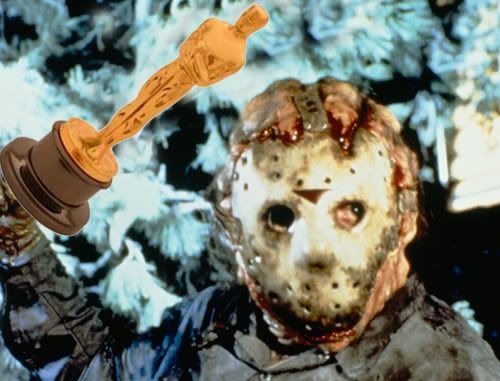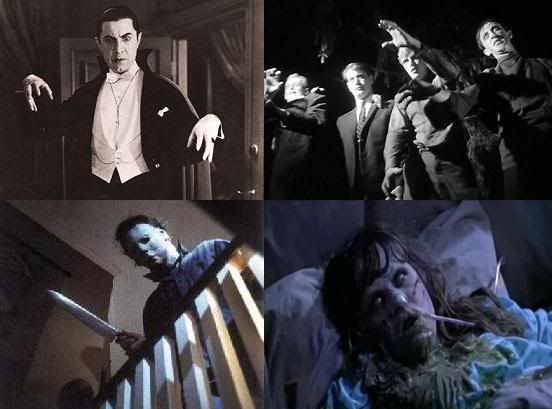There's something about the Nazis and the Holocaust that seemingly cries out for film makers to use World War II as a setting. Wal-Mart is actually selling a box set of twenty World War II movies for a whopping five dollars. Lately it seems that there's been a sudden influx in Nazi movies hitting the screens. Valkyrie. The Reader. Inglourious Basterds. Defiance. The Boy in the Striped Pajamas. Good. They just keep coming.
The thing is, these movies are all making bank at the box office and in the eyes of critics. Valkyrie was applauded in both America and Germany, with the latter country considering it a very fine history lesson. Although, they weren't crazy about the casting of Tom Cruise, considering Scientology isn't that popular in Germany. Quentin Tarrantino's Inglorious Basterds also did damn well at the box office, and I personally loved it. Granted, even though it takes more than its fair share of liberties with historical accuracy, the movie going public had no trouble over looking that. On the other side of the spectrum, the childhood drama The Boy in the Striped Pajamas focused less on military issues and more on a young Jew imprisoned in a concentration camp. While that too has come under attack for its historical accuracy, its heartstring pulling has wrapped up more than a few awards.
I'm not sure why the Holocaust is the in thing to make movies about again, but at least for now they're putting out quality films. Hopefully we'll get a few more films of note before the inevitable over saturation kicks in and film makers start pumping out Nazi schlock as fast as they can.
Wednesday, December 16, 2009
Youtube and Vevo

So I, like most people on the internet, absolutely love YouTube. While there's an over abundance of preteen vloggers taping their opinions that no one cares about, there is still a wealth of music, movies, comedy and most random interviews you'd ever want, right at your fingertips. A few months ago, Youtube added commercials before their videos. Most people were pissed, but I had no problem with it. It was a pretty rare occurance and their server bill has to be astronomical. Recently however, the commercials have been a lot more common, especially when watching videos through their newest headache: Vevo.
Basically Vevo is a musical outlet for Youtube. Any music video you find on youtube will now be surrounded by a big ugly Vevo skin, and your video will be unwatchable. For whatever reason, it's a very unstable system, and videos have to rebuffer about every four seconds. While they claim this is due to heavy traffic and will be remedied, I find it extremely annoying that something Youtube never had a problem with is suddenly an issue. One of the reasons Vevo was started was to get rid of duplicate music videos. In and of itself, there's nothing wrong with that; it's just cleaning the crap off their already strained server load. While I'm ok with that, why the hell did I have to reinvent the wheel to do this instead of just clearing out youtube? Thus far, fan reaction to Vevo has been absolutely horrible, and they'll have to act quickly not to piss off the core of their clientele. Sure, Youtube is the main man in the realm of streaming video, they're not the only ones, and if Youtube doesn't do respond, the competition will be reaping the benefits.
To make matters even worse, apparently the whole mess was thanks to a suggestion from U2 singer Bono, a man I absolutely despise. Insult to injury.
Monday, December 14, 2009
Wanna Be a Pop Star? No Talent Neccesary.
In a world where some of the most inane garbage is being put on youtube and their creators going on to gain minor celebrity status, it’s nice to see something of actual talent and merit going on to gain notoriety. I’m talking about the Gregory Brothers’ (and wife/sister-in-law) hit series, Autotune the News. Autotune is a program used to alter pitch, and these guys have applied it to politicians and newscasters to actually convert their speech into singing, alongside their own hip-hop commentary. The whole thing is brilliant, but the program itself is a very large concern. I’m not even talking about using the program to give voices a robotic tone, a recent trend that Cher started with “Believe” and has since been abused by the ilk of T-Pain, Lil Wayne, et al.
No, the problem I have with it is actually the very reason the program was created. It was invented to correct pitches that a performer makes during the recording process. It’s absolutely swept through the pop music world, and now “artists” don’t actually have to hit the pitches to have them recorded. And to make matters even worse, the technology is even appearing at live performances. Producers argue that “fans pay top dollar, they should see the artist in their top form.” The problem is, that isn’t THEIR top form; it’s the computers. In my mind, this is absolutely no different than the Milli Vanilli scandal in the late early 90s, but there is no end in sight for this disgusting trend in the music world.
Monday, December 7, 2009
Sarah Palin vs. Newsweek

Sure, I know I’m late to the party here, but I meant to write about this at the time and just never got around to it. About three weeks ago, Sarah Palin was fuming over a photograph taken for the fitness magazine Runner’s World, ending up on the cover of Newsweek (see above). She claimed that the photograph, which featured her in a pair of running shorts, was blatant sexism by the magazine. In her own words: “The Runner's World magazine one-page profile for which this photo was taken was all about health and fitness - a subject to which I am devoted and which is critically important to this nation. The out-of-context Newsweek approach is sexist and oh-so-expected by now.” I have to admit I have to agree with her here, as context can imply worlds in a field where image is so important; especially since she’s unwillingly been elevated to an unlikely minor sex symbol since becoming nationally known. There’s even been a pornographic movie released “based on” her political career.
Perhaps much more relevant to this course as a whole is the fact that the photographer was contractually forbidden from selling those pictures to another magazine for a year. The photographer, named Brian Adams, could be in hot water for this breach of contract, and proves to be just one more example of the trend of members of the media trading in their journalistic integrity for sensationalism. Meanwhile, Adams is claiming he knew nothing of the sale to Newsweek, and Newsweek is claiming they “purchased the photo from an agency and were not aware of any issues with it.” For what it’s worth, they did credit Runner’s World right on the cover, but that doesn’t necessarily imply they knew of the exclusivity contract.
Sources:
The Huffington Post
Daily Finance
Saturday, December 5, 2009
Is the Academy Scared of Horror?

In the world of cinema, there is no greater honor than winning an Academy Award; and there is no greater Academy Award than The Academy Award for Best Motion Picture. The award is presented annually Academy of Motion Picture Arts and Sciences to the greatest movie of the year; however, horror movies have largely been ignored by the academy. In fact, there's only been horror movie to have ever won this Award, and that is 1991's Silence of the Lambs (it actually ran the table that year, walking out with five of the most significant awards offered). This is kind of a stretch however, since it's actually much more of a psychological thriller than a horror movie. Now, this is much more than just "Waah, I like horror movies and they never win", because many of these movies have gone on to cement undeniable legacies in our culture.
Let's look at some of these horror movies, plus whatever won that year. I'll start off with 1978's Halloween. John Carpenter's introduction to the unstoppable killer Michael Myers would literally shape the world of horror for the next decade, as it would set the groundwork for Jason Voorhees, Freddy Krueger, and an entire army of one-off slashers. '78's Academy Award went to The Deer Hunter. Ever hear of it? Me neither (or any of the other nominations for that matter.) Ten years prior, George Romero basically invented the zombie genre with Night of the Living Dead. To this day, zombie movies still follow the "rules" that Romero laid out. A musical adaptation of Oliver Twist took the award that year. Yes, a story that was over 130 years old won out over a movie that literally created a sub-genre. Soon after, William Friedkin unleashed The Exorcist on unsuspecting movie audiences. This tale of a twelve year old girl's hellish ordeal with demonic possession shocked the movie going public to its core, and it's reputation as one of the scariest movies ever released is world renowned, along with images of Linda Blair puking green slime and rotating her head on her shoulders. To this day, it finds itself in the top three of any "Best Horror Movie" list you'll come across, if it doesn't top the list off altogether. I've never heard of 1973's Award winning picture, The Sting, but at least The Exorcist received a nomination that year. Not so lucky was 1931's adaptation of Bram Stoker's Dracula. The Count led the way of a whole slew of mon-stars that Universal released in the 30s, paving the way for the emergence of horror itself as a genre. Indeed, if someone says "Dracula", you're most likely to think of Bela Lugosi with slicked back hair and that piercing gaze. Cimarron won that year, and throughout Universal's fifteen years or so of releasing defining horror movies, they didn't receive so much as a sniff of a nomination.

I understand that horror is a somewhat controversial genre, but its cultural impact is undeniable. It's high time the Academy realized this and started giving credit where it's due, and acknowledging that even though they can be damned unnerving, their contribution to cinema deserves their attention. In my opinion, their sheer staying power demands it.
Subscribe to:
Posts (Atom)